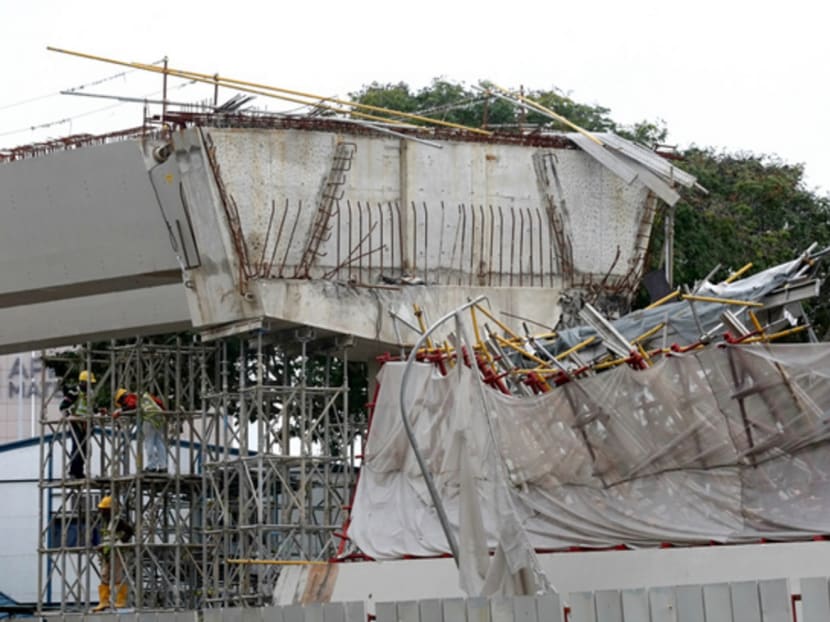322 notices issued to firms for flouting safety rules last month
SINGAPORE — Inspections conducted last month on 400 construction sites saw the Manpower Ministry (MOM) issuing 322 notices to firms for flouting workplace safety regulations.

Workers stand on scaffolding beside the collapsed structure at an LTA worksite along PIE on July 14, 2017. Photo: Nuria Ling/TODAY
SINGAPORE — Inspections conducted last month on 400 construction sites saw the Manpower Ministry (MOM) issuing 322 notices to firms for flouting workplace safety regulations.
The ministry also meted out 70 composition fines and four stop-work orders following the operation which focused on work at height. In total, more than 400 violations of the rules were found.
The majority of the non-compliance notices and composition fines were issued because of unsafe scaffolds and the lack of safe means of access, guardrails and barriers for “open sides and openings”. Three of the stop-work orders were related to the risks of working at a height, while the remaining one was for unsafe storage of goods and poor housekeeping.
A worksite may receive more than one notice of non-compliance and composition fine, depending on its condition during inspection, said the MOM.
The findings of the recent operation were revealed by Minister of State (Manpower) Sam Tan at a workplace safety and health forum yesterday, days after a partial collapse of a flyover viaduct being built at Upper Changi Road East.
Last Friday’s accident — one of the worst worksite accidents in Singapore in recent years killed Chinese national Chen Yinchuan, 31, and injured 10 others. As of yesterday, six workers remained hospitalised at Changi General Hospital: Khan Mohammed Sohan, 23, Moniruzzaman Mohammad, 34, Alam Shah, 33, Kathiresan Alaguraja, 30, Gao Li Qun, 49, and Barek Mohammad Abdul, 25.
Mr Gao and Mr Barek were in intensive care. Four workers — Chen Jiang Hui, 41, Wang Jun Wei, 40, Raihan Mohammad, 25 and Hossain Md Mithu, 22 — have been discharged.
The Migrant Workers’ Centre (MWC) said yesterday that it had paid visits to the workers, and those who have left the hospital were “able to sit up and move around by themselves”. “While some head and body aches persist, the workers are hopeful that they may be cleared to go back to work soon,” said MWC chairman Yeo Guat Kwang.
The accident happened at about 3.30am last Friday, and the workers had told reporters they were putting in extra hours on top of their regular shift.
Speaking to the media yesterday, Mr Tan said the investigations — led by the Land Transport Authority (LTA) — were still in progress and it was premature to comment. But he stressed: “If there’s any breach of the Employment Act, then of course the MOM will take the appropriate actions (against) the employer.”
MOM said its investigations would focus on the viaduct’s design and construction process, including the work hours of the workers involved.
In May, TODAY reported that in the past three years, an average of about 150 employers a year were found to have breached the limit of overtime work for their workers, based on MOM figures.
Separately, a Transient Workers Count Too (TWC2) survey conducted last November also flagged concerns over inadequate rest for foreign workers. The situation was particularly acute in the construction sector.
Construction workers approached by TODAY said that in general, their working hours do not stretch into the wee hours of the morning.
A worker at an LTA worksite in Clementi, who declined to be named, said a separate pool of employees would take over if it is necessary to carry on the work overnight. “We stop around 7pm, (but) if there’s any emergency, such as any (uncompleted) urgent roadworks, one or two (separate) groups will start work and do the night shift from 7pm to 7am,” said the worker from Eng Lee Engineering.
Bangladeshi worker Md Mostafizur Rahman, 29, from AMS Aircon Engineering, a subcontractor for the construction of the National University Centre for Oral Health, Singapore, said he works between 8am and 8pm from Mondays to Saturdays, and has never been asked to work overnight. “At most, I work until 10pm if I need to finish (something urgent), but only sometimes,” he added. He cited an instance when he felt unwell and was told by his supervisor to call it a day at 5pm. “He makes sure we have rest if our body doesn’t feel good,” said Mr Mostafizur.
Unison Construction managing director Tan Soon Kian said the firm’s 100-odd workers are not allowed to work beyond their stipulated hours. “We have (to follow) guidelines from the MOM,” he said.
Under the Employment Act, workmen earning a basic wage of up to S$4,500 a month and who work more than five days a week shall not clock more than eight hours daily or 44 hours weekly, with anything in excess deemed overtime work.
Unison Construction’s workers, who are mostly Bangladeshis and Indians, start at 8am and stop by 10pm from Mondays to Saturdays, with overtime pay duly given.
At Chh Construction System, managing director Nelson Tee said its more than 40 workers do not pull overnight shifts.
On weekdays, they work from about 8.30am to 7pm at the latest, while on Saturdays, they work between 8.30am and 5pm. “At most of our worksites, we’re not allowed to work late … we don’t want to disturb (others in the neighbourhood),” said Mr Tee, who also sits on the National Work at Heights Safety Taskforce.
Before work begins each morning, his firm’s safety officers will ask workers if they are unwell and had ample rest, for instance. If needed, the firm could give them “light work or ask them to take a day off”, he added.











